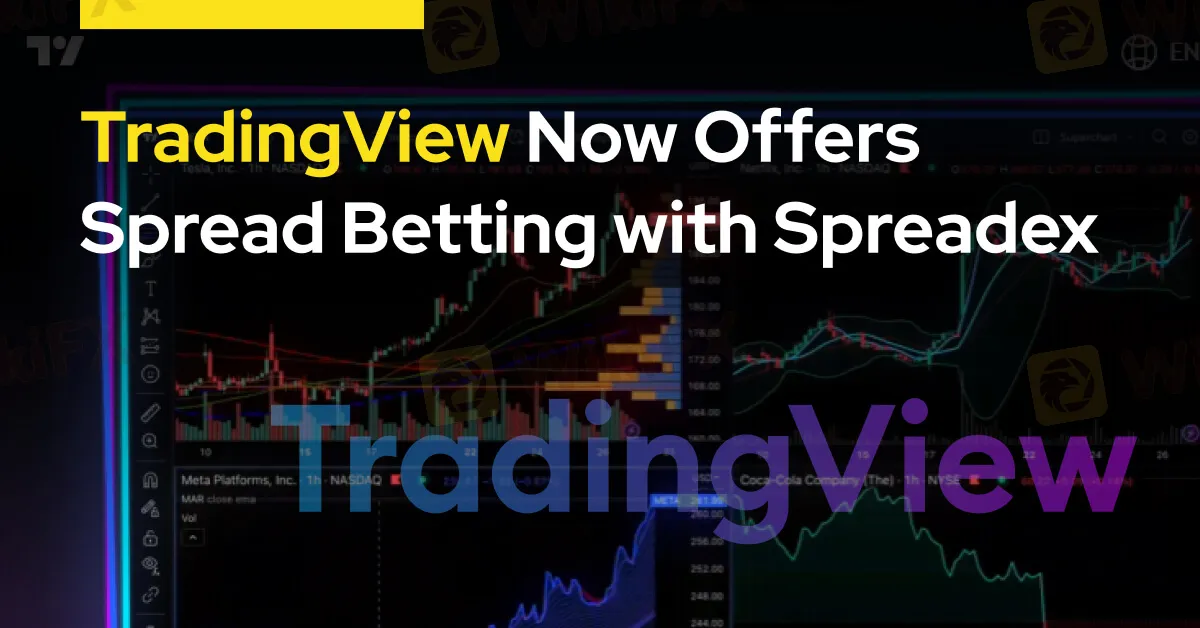简体中文
繁體中文
English
Pусский
日本語
ภาษาไทย
Tiếng Việt
Bahasa Indonesia
Español
हिन्दी
Filippiiniläinen
Français
Deutsch
Português
Türkçe
한국어
العربية
TradingView Now Offers Spread Betting with Spreadex
Abstract:TradingView, a social trading and charting platform, recently expanded its collaboration with UK-based brokerage Spreadex to incorporate spread betting functionality, as announced on Tuesday.

TradingView, a social trading and charting platform, recently expanded its collaboration with UK-based brokerage Spreadex to incorporate spread betting functionality, as announced on Tuesday.
With this integration, TradingView users can now seamlessly access spread betting features directly from TradingView's charting interface while logged into their Spreadex brokerage accounts.

TradingView, with a vast user base exceeding 30 million globally, integrates with various data feeds to grant users access to over 1.3 million financial instruments worldwide. The company has experienced robust growth in recent years as retail traders increasingly turn to social trading platforms.
Spreadex, established since 1999, is a reputable provider of contracts for difference (CFDs) and spread betting services. Spreadex joins a growing roster of brokers collaborating with TradingView to offer trading capabilities directly through the platform's advanced charting interface. Noteworthy partners include FxPro, Oanda, and AMP Global.
To utilize spread betting through TradingView, users need to log into their Spreadex brokerage account via the trading panel and look for symbols prefixed with “SPREADEXSB:” in the platform's symbol search function. This enhancement adds to Spreadex's existing range of tradable instruments on TradingView, encompassing index CFDs, stock CFDs, and currency pairs.

Spread betting and trading CFDs both involve speculating on the price movements of various assets without owning the underlying asset. However, there are key differences between the two. In spread betting, investors bet on whether the price of an asset will rise or fall within a certain time frame, with profits or losses determined by the accuracy of the bet and the size of the market movement. Spread betting allows investors to profit from both rising and falling markets and is often exempt from certain taxes, such as stamp duty and capital gains tax. On the other hand, trading CFDs involves buying or selling contracts based on the price movements of assets, with investors entering into contracts with a broker to exchange the difference in the value of the underlying asset between the time the contract is opened and when it is closed. While both spread betting and trading CFDs offer opportunities to profit from market movements, they differ in their mechanics and tax implications.

Disclaimer:
The views in this article only represent the author's personal views, and do not constitute investment advice on this platform. This platform does not guarantee the accuracy, completeness and timeliness of the information in the article, and will not be liable for any loss caused by the use of or reliance on the information in the article.
Read more

MultiBank Group Wins Big at Traders Fair Hong Kong 2024
Discover how MultiBank Group, a global leader in financial derivatives, secured three prestigious awards at Traders Fair Hong Kong 2024, highlighting its innovative trading solutions and industry excellence.

CySEC Settles Compliance Case with Fxview Operator Charlgate Ltd
Discover how CySEC resolved compliance issues with Charlgate Ltd, the operator of Fxview, through a €50,000 settlement. Explore the investigation, regulatory measures, and CySEC's new website designed for improved accessibility and transparency.

TradingView Launches Liquidity Analysis Tool DEX Screener
Discover TradingView's DEX Screener, a powerful tool for analyzing decentralized exchange trading pairs. Access metrics like liquidity, trading volume, and FDV to make smarter, data-driven trading decisions.

WikiFX Review: Is PU Prime a decent broker?
In today’s article, we have made a comprehensive review of a broker named PU Prime. We wonder if PU Prime is a scam or a reliable broker.
WikiFX Broker
Latest News
Geopolitical Events: What They Are & Their Impact?
Volkswagen agrees deal to avoid Germany plant closures
Top 10 Trading Indicators Every Forex Trader Should Know
WikiEXPO Global Expert Interview: Simone Martin—— Exploring Financial Regulation Change
TradingView Launches Liquidity Analysis Tool DEX Screener
MultiBank Group Wins Big at Traders Fair Hong Kong 2024
'Young investors make investment decisions impulsively to keep up with current trends' FCA Reveals
Why Do You Feel Scared During Trade Execution?
CySEC Settles Compliance Case with Fxview Operator Charlgate Ltd
Malaysian Influencer Detained in Taiwan Over Alleged Role in Fraud Scheme
Currency Calculator


